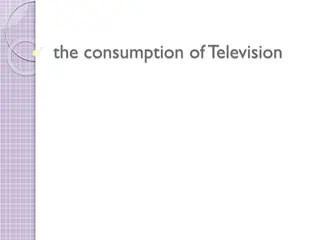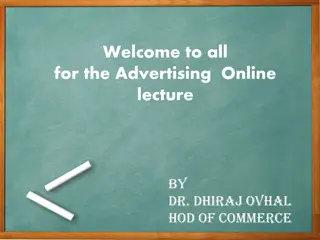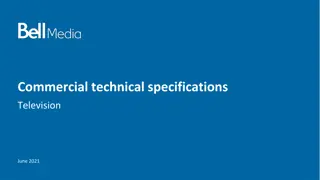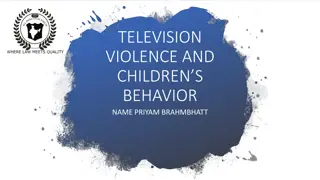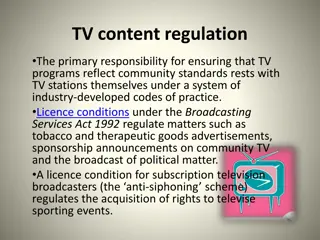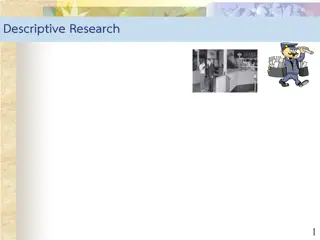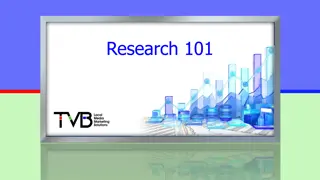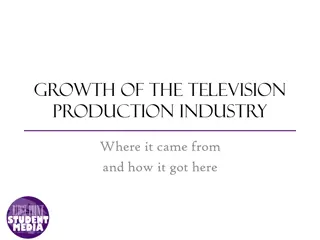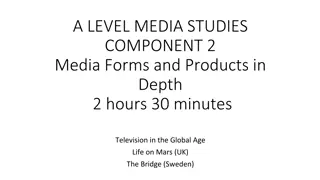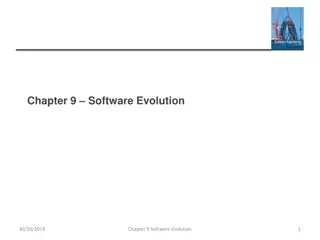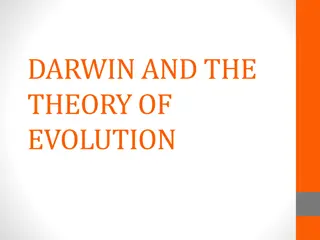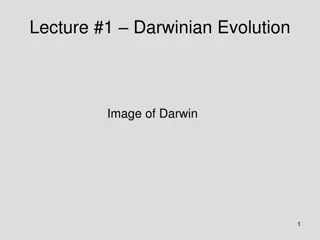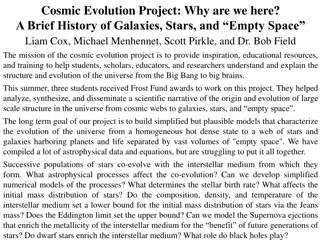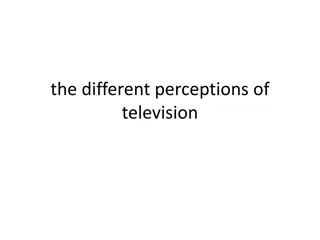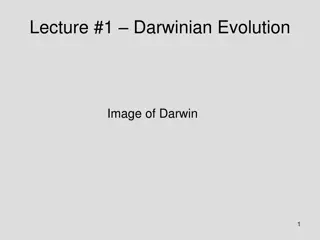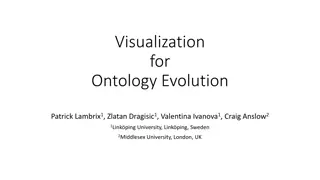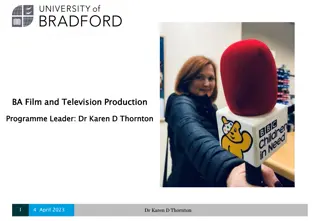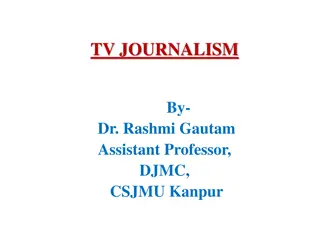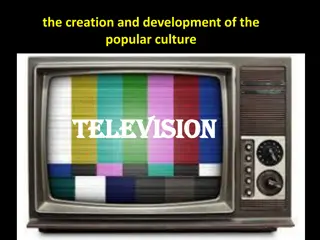Mass Media and Communication for the Academic Year 2020/2021
This content delves into the science of media, communication, and mass communication for the academic year 2020/2021. It explores the role of mass media in public communication, the characteristics of mass media, and the various types of mass media such as books, print media, films, radio, televisio
10 views • 11 slides
Evolution and Plant Systematics Lecture Overview
This lecture outline delves into the concepts of evolution, unity, and diversity of organisms on Earth, covering topics such as fossils, Lamarck and Darwin's theories, adaptation, natural selection, artificial selection, Carolus Linnaeus' systematics, plant evolution, and the demonstration of evolut
5 views • 26 slides
Essential Lighting Techniques in Television Production
Lighting is a vital aspect of television production, setting the mood and enhancing the overall broadcast quality. Key lighting illuminates the subject, fill lighting reduces shadows, backlighting adds depth, side lighting creates drama, rim lighting highlights the subject, and mood lighting sets th
3 views • 9 slides
The Impact of Reality Television on Society
Reality television, where fact is sometimes stranger than fiction, has a significant influence on society. This form of entertainment often showcases ordinary people in various scenarios, leading to desensitization and acceptance of negative behaviors like aggression and bullying. The ethical implic
7 views • 17 slides
Television Commercial Production Process
Television commercials (TVCs) play a crucial role in advertising, promoting products, services, and ideas to a wide audience through television broadcast. This comprehensive guide covers the definition of TVCs, their objectives, steps in the production process (pre-production, production, post-produ
3 views • 34 slides
Magnetic Force and Acceleration of Electrons in Television Picture Tubes
An electron in a television picture tube is analyzed as it moves towards the front of the tube in a magnetic field. The magnetic force and acceleration of the electron are calculated, along with determining the linear speed of a proton moving in a circular orbit under a magnetic field. Additionally,
0 views • 6 slides
Audio Basics in Television Operations
Until recently, television focused more on video than audio. However, with advancements like stereo and surround sound, audience expectations have risen. This article delves into the fundamental characteristics of sound – loudness and frequency – and explores the various decibel levels in differ
6 views • 33 slides
The Impact of Popular Culture on Social Change Through Television
Popular culture, as portrayed through television, holds the power to influence societal norms, intercultural understanding, and global awareness. While it can promote positive social change and awareness, there are concerns about cultural imperialism, excessive TV consumption, and the cultivation th
0 views • 15 slides
Roles and Responsibilities of Radio and Television Announcers
Radio and television announcers play a vital role in presenting program information, news, sports, and commercials to audiences both on and off the air. They read scripts, conduct interviews, moderate discussions, and engage with the community. Announcers at smaller stations often have additional du
0 views • 18 slides
The Relationship Between Mythology, Heroes, and Television Consumption
The consumption of television is prevalent across all demographics, connecting diverse audiences to a shared experience. By examining the influence of heroes and mythology on television content, we uncover how characters embody societal ideals and values. Through storytelling, television programs su
3 views • 18 slides
Evolution of Advertising: A Historical Overview
The evolution of advertising from early trade marks to the birth of printing press, advertising agencies, radio advertising, and television advertising. This journey showcases the transformation of communication mediums and strategies that have shaped the modern advertising industry.
0 views • 20 slides
Commercial Technical Specifications for Television Channels - June 2021
This document details the technical specifications and application guidelines for content suppliers delivering material to various television channels under Bell Media. It includes information on traffic communication, parameters, electronic file delivery, and commercial instructions. Suppliers must
2 views • 12 slides
The Impact of Civil Rights Movement and President Eisenhower's Legacy
Explore the significant events like the Civil Rights Movement, the popular presidency of Dwight D. Eisenhower, the Federal Aid Highway Act of 1956, the Baby Boom Years, and the advent of television in the lives of Americans during the mid-20th century. Learn about civil rights, segregation, the Brow
3 views • 24 slides
Impact of Television Violence on Children's Behavior
Television violence has a significant influence on children's behavior as they may become desensitized to violence and even mimic what they see on TV. Parents need to monitor and limit their children's TV viewing, engage in discussions, and block inappropriate content to protect them from negative e
0 views • 15 slides
Television Content Regulation in Australia
Television content regulation in Australia is overseen by industry-developed codes of practice and specific licence conditions under the Broadcasting Services Act 1992. TV stations hold the primary responsibility to ensure that programs reflect community standards. Regulations cover areas such as to
0 views • 12 slides
Evolution of Compact Star-Forming Galaxies and Quiescent Galaxies
The evolution of galaxies from compact star-forming to quiescent states involves processes such as secular evolution, gas inflows, and star formation quenching. By studying the structural relations and star formation in these galaxies, insights are gained into their transition towards quiescence. Th
0 views • 12 slides
The Scopes Monkey Trial: Clash of Cultures and Evolution Debate
Following World War I, the Scopes Monkey Trial in Tennessee marked a pivotal clash between urban and rural cultures over the teaching of evolution. The trial, prosecuted by William Jennings Bryan and defended by Clarence Darrow, resulted in teacher John Scopes being found guilty of violating the ant
0 views • 9 slides
Evolution of Survey Research Methods in Data Collection
Descriptive research explores the popularity of surveys to understand consumer behavior, demographic insights, and lifestyle perspectives. The use of different survey modes, such as personal interviews and online surveys, has transformed data collection methods. Advantages and disadvantages of onlin
0 views • 18 slides
Television Research: Markets, Measurement, and Methodologies
Explore the world of television research through topics such as television markets, measurement approaches, local measurement services like Nielsen and Comscore, and Nielsen's measurement methodologies. Learn about Designated Market Areas (DMAs), Household Demographics, People Meters, Portable Peopl
0 views • 42 slides
Rules and Practices for Software Evolution Support
This content focuses on the importance of rules and practices to support software evolution, addressing challenges, benefits, and impact on ecosystems. It emphasizes the need for system-specific rules, automatic extraction of conventions, and client support. The evolution of software is highlighted
0 views • 65 slides
Importance of Programming Diversity in Television Broadcasting
Diversity of programming in television is crucial for democracy and meeting the varied needs of audiences. The content emphasizes the significance of quality, independent programming that reflects a spectrum of opinions to inform the public effectively. It also discusses the impact of TV content on
0 views • 13 slides
Evolution of Television Production Industry and Communication Technologies
The growth of the television production industry is traced from early forms of communication such as drumbeats and smoke signals to the invention of the telegraph by Cooke and Wheatstone in 1830. The development of Morse code and wireless telegraphy by Guglielmo Marconi in 1899 revolutionized commun
0 views • 23 slides
Analysis of Genre Elements in Life on Mars and The Bridge
Television series like Life on Mars (UK) and The Bridge (Sweden) exemplify various genre theories and narrative structures. From discussing social, cultural, economic, and political factors affecting production to exploring media language and Neale's Genre Theory, these shows showcase how genres osc
0 views • 13 slides
Software Evolution: Managing Change and Evolution in Organizational Systems
Software evolution is an essential process for organizations to maintain the value of their critical business assets. It involves adapting to new requirements, addressing errors, and enhancing performance. The majority of software budgets in large companies are dedicated to evolving existing systems
0 views • 61 slides
Darwin and the Theory of Evolution: A Comprehensive Overview
Darwin's Theory of Evolution encompasses the concepts of organisms changing over time and life evolving through natural selection. Influenced by scientists such as James Hutton, Jean Baptiste Lamarck, and Alfred Russel Wallace, Darwin's theory culminates in the idea of evolution by natural selection
0 views • 9 slides
Evolution: Key Concepts and Perspectives
Explore the concepts of Darwinian evolution, evidence for evolution, Darwin's theory, and the Modern Synthesis. Delve into the spiritual versus intellectual perspectives, the diversity of religious affiliations globally, and the compatibility of faith and science in understanding the natural world a
0 views • 91 slides
Broadcast Television and Radio: A Comprehensive Course Overview
This course delves into the history, contemporary forms, and impact of broadcast television and radio, exploring academic approaches, traditions, and critical orientations in the field. Students will analyze ownership structures, audience dynamics, regulatory frameworks, and content production in na
0 views • 7 slides
Unveiling the Cosmic Evolution: A Journey Through Galaxies, Stars, and Empty Space
Delve into the intricate story of the universe's evolution from its hot dense origins to the vast cosmic web of stars and galaxies. Explore questions on stellar birth rates, interstellar medium influences, and the role of dark energy. Follow the journey of three students working on the Cosmic Evolut
0 views • 30 slides
The Importance of Pre-Production in Television Program Production
The process of producing a television program is divided into three stages: Pre-Production, Production, and Post-Production. Pre-Production is vital as it involves setting goals, planning, and decision-making, which ultimately lead to smoother production and editing processes. Planning saves time, e
0 views • 17 slides
Different Perceptions and Resistance to Television
Television plays a significant role in Australian lives, with resistance stemming from factors like content and over-commercialization. Some resist due to concerns about cultural identity, while others reject television altogether. Acceptance of television is evident through its widespread use as a
0 views • 16 slides
Future of ITU-D Study Question 8/1 Report Analysis
This report delves into the impact of terrestrial television broadcasting coexisting with telecommunication services, focusing on the transition to digital terrestrial television. It covers strategies for analogue switch-off, spectrum planning, and digital dividend use. The report also includes case
0 views • 16 slides
Evolution: Key Concepts and Perspectives
Explore the key concepts of Darwinian evolution, including evidence for evolution, Darwin's theory, and the Modern Synthesis. Reflect on the relationship between spiritual and intellectual perspectives, emphasizing that different ways of thinking can complement each other. Discover the diversity in
0 views • 91 slides
Visualizing Ontology Evolution for Improved Knowledge Management
Ontologies are dynamic entities that evolve over time, impacting semantically-enabled applications and knowledge acquisition. This work focuses on identifying desired functionalities for ontology evolution systems, highlighting the steps involved in ontology evolution, and emphasizing the importance
0 views • 16 slides
Gender Equity Policies in Film and Television Analysis Interview
Explore the evolution of gender equity in the film and television industries of Canada, Germany, and the UK over the past decade. Dive into the success, challenges, and potential interventions for enhancing gender equity. Uncover expert insights on the industry's commitment to gender equality and ra
0 views • 17 slides
BA Film and Television Production Program at University of Bradford
Explore the BA Film and Television Production program led by Dr. Karen D. Thornton at the University of Bradford. Gain valuable skills in a nurturing environment, work with industry professionals, and be part of a diverse community. Prepare for a career in the creative industries with hands-on exper
0 views • 9 slides
Evolution of Indo-European Languages through Phylogeny Estimation
Explore the evolution of Indo-European languages through phylogeny estimation under a model of linguistic character evolution. Follow the Computational Historical Linguistics Project's collaboration that began in 1994, leading to the development of methods and studies on homoplasy-free evolution and
0 views • 61 slides
TV Camera Shots and Functions in Television Productions
Explore the fascinating world of television camera shots and functions, including how the camera emulates the human eye, different movements of the camera and lens, and the various techniques used in television production to create dynamic visuals. From zooming in and out to panning and tilting, lea
0 views • 13 slides
Evolution and Development of Television Journalism
Television journalism has evolved over the years, with pioneers like John Baird and the BBC leading the way. The transition from black and white broadcasts to color marked a significant milestone. In India, television started as an experiment in 1959 and gradually expanded to reach a wider audience.
0 views • 8 slides
The Evolution of Television: From Baird's Invention to Modern Broadcasting
Television has evolved from its humble beginnings with John Logie Baird's invention to become an integral part of modern life, offering entertainment, advertising, and diverse programming. The journey of television includes significant milestones such as the demonstration of color television, transa
0 views • 30 slides
Exploring TV Unit Options for Every Style: Mirrored, Glass, and Wooden Designs
When it comes to selecting the perfect television unit for your living space, there are a variety of materials and designs to choose from. Your TV unit not only needs to accommodate your television but also blend harmoniously with your interior style
0 views • 2 slides









